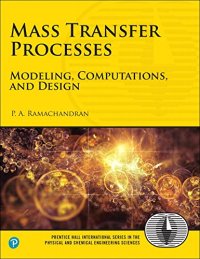
Ebook: Mass Transfer Processes: Modeling, Computations, and Design
Author: P. A. Ramachandran
- Tags: Chemical, Coatings Ceramics & Glass, Cosmetics, Fluid Dynamics, Plant Design, Plastics, Unit Operations & Transport Phenomena, Engineering, Engineering & Transportation, Chemical Engineering, Engineering, New Used & Rental Textbooks, Specialty Boutique
- Series: Prentice Hall International Series in the Physical and Chemical Engineering Sciences
- Year: 2018
- Publisher: Prentice Hall
- Edition: 1
- Language: English
- djvu
The All-in-One Guide to Mass Transport Phenomena: From Theory to Examples and Computation
Mass transfer processes exist in practically all engineering fields and many biological systems; understanding them is essential for all chemical engineering students, and for practitioners in a broad range of practices, such as biomedical engineering, environmental engineering, material engineering, and the like. Mass Transfer Processes combines a modern, accessible introduction to modeling and computing these processes with demonstrations of their application in designing reactors and separation systems.
P. A. Ramachandran’s integrated approach balances all the knowledge readers need to be effective, rather than merely paying lip service to some crucial topics. He covers both analytical and numerical solutions to mass transfer problems, demonstrating numerical problem-solving with widely used software packages, including MATLAB and CHEBFUN. Throughout, he links theory to realistic examples, both traditional and contemporary.
- Theory, examples, and in-depth coverage of differential, macroscopic, and mesoscopic modeling
- Physical chemistry aspects of diffusion phenomena
- Film models for calculating local mass transfer rates and diffusional interaction in gas—solid and gas—liquid reaction systems
- Application of mass transfer models in rate-based separation processes, and systems with simultaneous heat and mass transfer
- Convective mass transfer: empirical correlation, internal and external laminar flows, and turbulent flows
- Heterogeneous systems, from laminar flow reactors, diffusion-reaction models, reactive membranes, and electrochemical reactors
- Computations of mass transfer effects in multicomponent systems
- Solid—gas noncatalytic reactions for chemical, metallurgical, environmental, and electronic processes
- Applications in electrochemical and biomedical systems
- Design calculations for humidification, drying, and condensation systems and membrane-based separations
- Analysis of adsorption, chromatography, electrodialysis, and electrophoresis